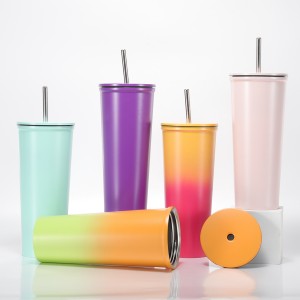In recent years, plastic products have been used more and more frequently, which not only brings convenience to people, but also creates a series of environmental problems, such as white pollution, water pollution, soil pollution, climate change, etc. In order to achieve green development and sustainable development, our country has put forward the concept of “lucid waters and lush mountains are invaluable assets”. In order to better implement the concept of green development and reduce the harm of plastic pollution to the environment, we need to further promote the use of thermos cups and other environmental protection measures, and promote the classification, recycling and reuse of domestic waste. From the perspective of environmental protection, we will discuss the environmental protection comparison between thermos cups and disposable tableware, convenient chopsticks and other tableware.

1. Contamination problem of disposable tableware
The pollution of disposable tableware mainly comes from plastic and paper. Plastic mainly comes from various disposable plastic products, such as plastic cups, plastic bags, plastic bowls, etc., while paper mainly comes from raw materials in the paper industry. At present, the number of disposable tableware produced in my country every year reaches about 3 billion, and its recycling and reuse are still an urgent problem to be solved.
2. Recycling and reuse of disposable tableware
If the large amounts of discarded plastic waste generated during the production, sale and use of disposable tableware are not recycled, it will not only occupy a large amount of land and increase the cost of urban waste disposal, but also cause pollution to the soil, air and water environment. At present, the recycling and reuse of disposable tableware in my country mainly includes the following two methods:
1. The enterprise organizes personnel to recycle;
2. Recycling by the environmental sanitation department. In our country, due to imperfect garbage classification and collection, many disposable tableware are discarded or landfilled at will, causing serious environmental pollution.
3. Comparison of environmental protection between thermos cups and disposable tableware, convenience chopsticks and chopsticks
Disposable tableware is mainly made of plastic and uses plant fibers such as wood or bamboo as raw materials. The production process requires the use of large amounts of water and fuel.
Disposable tableware can generally only be used once and will be thrown into the trash can, causing environmental pollution.
Convenient chopsticks and chopsticks are made of wood or bamboo. The production process requires a lot of water and wood, and they are easily thrown into the trash.
Thermos cup: The thermos cup is made of stainless steel and does not contain plastic components. It will not produce waste water and waste gas during the production process, and will not pollute the environment.
4. The promotion significance of environmental protection measures such as thermos cups
The promotion and application of thermos cups can not only effectively reduce the harm caused by plastic waste to the environment, but also reduce plastic pollution from the source. What we have to do is to make more people aware of the dangers of disposable tableware, so that they can actively choose to use recyclable thermos cups and other environmentally friendly tableware.
At the same time, promoting the use of environmental protection measures such as thermos cups can also make people pay more attention to environmental protection and health in their daily lives. Taking disposable tableware as an example, we must actively choose to use recyclable and environmentally friendly tableware in our daily lives. This can not only avoid environmental pollution caused by disposable tableware, but also avoid wasting resources, and can also bring health to ourselves. Environmental protection measures such as thermos cups can reduce the harm of plastic pollution to the environment from the source and fundamentally solve the problem of plastic pollution.
Post time: Jun-14-2024